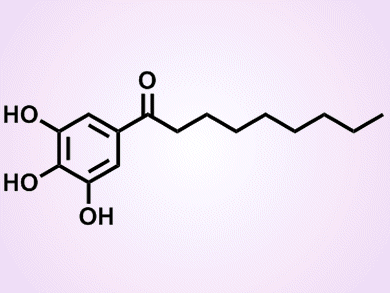Melanoma is an aggressive skin cancer. Although early-stage forms of this tumor are successfully treated with surgery, late-stage forms are resistant to therapies. Malignant melanoma cells, in fact, are resistant to apoptosis, a programmed cell death elicited by conventional chemotherapeutic drugs.
Quiao Wu, Xiamen University, China, and colleagues identified a compound that kills melanoma cells through an apoptosis-independent mechanism. The new chemical, 1-(3,4,5-thrihydroxyphenyl)nonan-1-one (THPN; pictured), triggers the death of malignant skin cells through autophagy, a process whereby cells self-digest their main intracellular components. As a consequence, THPN successfully inhibited tumoral growth when tested in animal models.
This compound may, thus, offer new promises for melanoma treatment.
- Orphan nuclear receptor TR3 acts in autophagic cell death via mitochondrial signaling pathway,
Wei-jia Wang, Yuan Wang, Hang-zi Chen, Yong-zhen Xing, Feng-wei Li, Qian Zhang, Bo Zhou, Hong-kui Zhang, Jie Zhang, Xue-li Bian, Li Li, Yuan Liu, Bi-xing Zhao, Yan Chen, Rong Wu, An-zhong Li, Lu-ming Yao, Ping Chen, Yi Zhang, Xu-yang Tian, Friedrich Beermann, Mian Wu, Jiahuai Han, Pei-qiang Huang, Tianwei Lin, Qiao Wu,
Nat. Chem. Biol. 2013, 10, 133–140.
DOI: 10.1038/nchembio.1406




